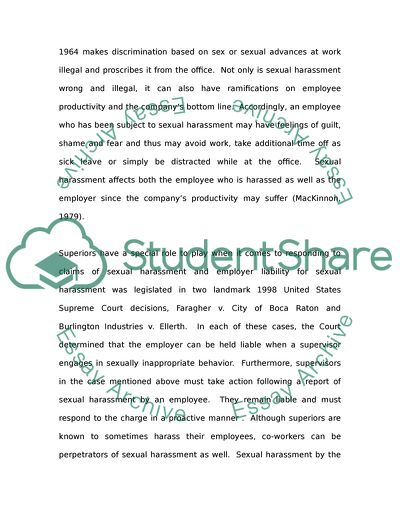
- Home
- Free Samples
- Premium Essays
- Editing Services
- Extra Tools
- Essay Writing Help
- About Us
- Studentshare
- Subjects
- Miscellaneous
- Corrections and organization
Corrections and organization - Essay Example

- Subject: Miscellaneous
- Type: Essay
- Level: Undergraduate
- Pages: 4 (1000 words)
- Downloads: 0
- Author: lisandro85
Extract of sample "Corrections and organization"
The following will explore sexual harassment as a form of discrimination and will look at its effects on workers. We will explain the laws protecting workers from harassment in the workforce, the role of supervisors when claims of sexual harassment are made and the specific federal guidelines which apply in harassment cases. Sexual harassment could be defined as unwanted sexual attention at the workplace and this can be given by both a fellow co-worker or by a superior. Sexual attention or advances which are unwanted are completely inappropriate in an office setting and represent a form of subtle discrimination.
Although the discrimination may appear to be positive, in fact it’s not and it is illegal. The Civil Rights Act (CRA) of 1964 makes discrimination based on sex or sexual advances at work illegal and proscribes it from the office. Not only is sexual harassment wrong and illegal, it can also have ramifications on employee productivity and the company’s bottom line. Accordingly, an employee who has been subject to sexual harassment may have feelings of guilt, shame and fear and thus may avoid work, take additional time off as sick leave or simply be distracted while at the office.
Sexual harassment affects both the employee who is harassed as well as the employer since the company’s productivity may suffer (MacKinnon, 1979). Superiors have a special role to play when it comes to responding to claims of sexual harassment and employer liability for sexual harassment was legislated in two landmark 1998 United States Supreme Court decisions, Faragher v. City of Boca Raton and Burlington Industries v. Ellerth. In each of these cases, the Court determined that the employer can be held liable when a supervisor engages in sexually inappropriate behavior.
Furthermore, supervisors in the case mentioned above must take action following a report of
...Download file to see next pages Read MoreCHECK THESE SAMPLES OF Corrections and organization
Recruiting and Training of Correction Officers
Institutional-Based Corrections
Evidence Based Management with relation to Corrections
Crowding Effect on Correctional Organizations
Correctional Officers
Analysis of a Correctional Captain in Alabama
Organizational Change
Community Based Corrections and their Effectiveness

- TERMS & CONDITIONS
- PRIVACY POLICY
- COOKIES POLICY